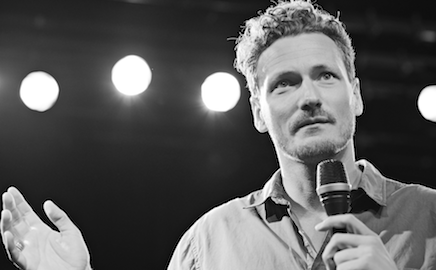Thomas Kolster, a 35-year-old former Danish-English copywriter and concept developer, after almost a decade of working with a number of global brands at some of the world’s leading advertising agencies one day realized that he hated 99% of advertising and messages those brands communicated. In 2010, he dared to raise the question that everybody thought of, but was ‘uncomfortable’ to discuss in public—in his debut book called “Goodvertising: Creative advertising that cares,” published by Thames & Hudson last year.
As a passionate sustainability adopter, Thomas believes in positive power of sustainable business ethos and advertising for good. In this interview, we’ve discussed how the perception of sustainability as a term varies in different countries, why it is easier for challenger brands to be sustainable, what the role of philanthropy in the brands’ sustainability strategy should be, and why sustainability can’t become a new religion.

— Thomas, why do you think the term sustainability is often misperceived and referred to (by consumers, first of all) as “environmental responsibility” only, ignoring its social, cultural and economic aspects? In many languages, Russian for example, there are no precise equivalents or translations of the word “sustainability”. Why?
— Actually, I don’t have an answer. I can say that it’s quite the same in Danish—the understanding of “sustainability” has to do more with an environmental movement, first of all. And it’s a shame, because from a business prospective, there has to be an economic equation. I think it’s up to communication strategies of leading brands to change this misperception and focus on other aspects of sustainability, except the environmental. I think that the perception of the term varies in different countries and partly depends on the level of social welfare. I’ve recently been to the South Africa and can say that it’s hard to think of an environmental initiative that is not at the same time a social initiative. I think that’s the case in all BRIC and developing countries—people don’t see the correlation between the environment and their level of wellbeing, they perceive green issues as something that doesn’t affect them directly. As some severe problems like poverty and shortage of food and water persist in those countries, the social/philanthropic side of sustainability is more important to them. Vice versa, in the developed and economically stable countries with the high level of social welfare, more attention is being paid to green issues.
The other day, I’ve read an interesting article that argues whether sustainability really exists at all. Because there are not very many products that we can call truly sustainable, and not that many business models that we can call sustainable either. So maybe we’re using the term where we actually need to use something else.
—Don’t you think that sustainability these days is more down to PR and greenwashing? Especially when it comes to global companies, monopolists in their fields?
—Well, I’m actually a little bit more positive about it. I think it’s important for companies not to hide some unpleasant facts about their production processes and ingredients they use, but to talk about them, to communicate the issues publicly and work on them. It is important that more and more global companies start to raise the question of sustainability and create the right thinking and philosophy of consumption. That’s about change—it’s an ongoing journey. And I’m sure that greenwashing is at least better than doing nothing.
—Is having a sustainability strategy a prerogative of bigger businesses? How can a small company make difference in this area?
—I think it’s on the contrary now—smaller brands challenge bigger companies, as it’s faster and easier for them to embrace sustainable principles in their businesses. Especially, if it’s a startup built from scratch around a smarter, innovative idea, which is sustainable at its core. For example, when in London, I met with the guy who founded the Oat Shoes company that produces 100% biodegradable shoes. Two years ago he was just a Dutch student full of ambitions and enthusiasm to create the world’s first biodegradable shoe. Everybody in the industry told him that that was not possible, nevertheless, one year and a half later he actually did produce the world’s first biodegradable shoe—he put inside a little seed that can be watered and grown in your garden after the shoes are out of use.
Another example is Tesla Motors. For less than 10 years they have become a leader of the electric cars market, having grown from a small Silicon Valley-based startup.
Although to change something big is harder than to build something new, bigger companies have a huge impact on our lives—so when they change their businesses, they make a considerable and meaningful step forward. For example, Walmart made a pledge that all its stores across the U.S. will be energy-efficient and the production of renewable energy will increase by 600 percent by 2020. Isn’t that exciting?
—You’ve just mentioned the electric Tesla cars. Have you ever though that sustainability movement, especially in its environmental aspect, is a real danger for a so-called fuel economy—that’s why it is not on a political agenda in some countries like Russia, China to name a few?
— That’s a good question we keep asking ourselves—why haven’t we seen any tangible results out of governmental programs, but see real changes coming from visionary companies. Partly we should blame governments and politicians for not being able to go against big businesses that lobby their interests in such industries as energy, pharmaceutics, car manufacturing etc.
I see some strategies from around the world where governments are more daring. Denmark, for example, was the first country in the word to implement an environmental law in 1973. The country actively promotes energy efficiency, and this year the plan has been set to make the Danish capital carbon-neutral by 2025. Nevertheless, there are still coal power plants in Denmark among other environment polluters.
—Sustainability should fight overconsumption, your Goodvertising book states. Does this mean that sustainable living in the near future leaves no room for luxury brands? What is sustainable luxury to your mind?
—I think it’s fascinating to see how we’re moving in that direction. Take Tesla—I think that’s a brilliant example of sustainable luxury. I’m sure that those luxury brands that do not embrace sustainability will eventually be challenged—probably, not in the nearest future.
Probably, luxury is something different from what we are used to think of it? Maybe luxury is not about working hard and playing hard? One of the things that I’ve seen changed before the financial crisis was how people compete by the size of campaign bottle. And that’s not really that fashionable any more. We see a lot of younger billionaires now that are more environmentally conscious. Take Mark Zuckerberg—he drives a hybrid electric car.
I think we’ll see a transformation of luxury like we’ve seen the change of our attitudes towards health and wellbeing. Now being healthy and fit is more of a status thing—so luxury is being redefined as well as the health dilemma. I think real luxury is to focus less on money but more on happiness, on being together, spending time with family and friends. I think we’ll see redefinition of many concepts that we are used to now.
—Speaking of happiness and social responsibility. Do you think philanthropy should be part of sustainability strategy of a company?
—I think brands should put sustainability and value-driven principles at the core of their businesses, and not use philanthropy as an excuse. We need to see more commitment rather than signing out checks and financing different R&D centers and other foundations. Look at the financial crisis—funding of a number of charitable initiatives around the world had been cut down at that time. So it’s more meaningful and useful for all stakeholders when businesses produce goods or deliver services that genuinely improve people’s lives.

—Your new project, WhereGoodGrows. Why do you think the communication/branding/advertising industry needs such a platform?
Our main goal is to bring brands, non-profits and foundations together to share their experience and knowledge of tacking global sustainability issues. GWW will be a business-to-business communication platform featuring successful case studies and ideas. The time has come to realize that we can’t stick to our own ideas only—all the industries should join their forces and copy each other’s sustainable best practices to adapt them locally. Any successful idea in any area of sustainability, be it recycling, health and medicine, renewable and efficient energy. For example, GSK shares their medical patents; Nike organizes its Green Xchange platform —there are plenty of examples when brands share their expertise for everyone’s good.
—What does being a sustainability mover and shaker mean to you, both personally and on a professional level? Don’t you think that sustainability has become a sort of new religion nowadays?
—I think, again, it depends on what you mean by sustainability—there’re more than a hundred of definitions. Sometimes I try to find my own asking myself what I can do in the world, what my role is, how I can limit my impact, how I can adapt sustainable practices. In my day-to-day shopping habits I try to make the right choices in favor of sustainable products, my beliefs also influence how I eat and travel. But my biggest positive contribution is to get more companies and brands to change in a more sustainable direction. People start to realize that environment and health come hand in hand, so they tend to choose sustainable products. The role of brands here is to provide a broader range of sustainable choices, to help consumers find what attracts them in sustainability movement, and gradually make it a normal daily practice.
Regarding religion, I wouldn’t push to call sustainability a new religion; I’d call it an ideology or a battle of values. That’s a new consumer paradigm that should make people think why they buy stuff, if they really need it, if it makes them happier? I think that the sustainability movement has given a start to the new capitalism of “we”, not “me” based on shared interests and caring about tomorrow.